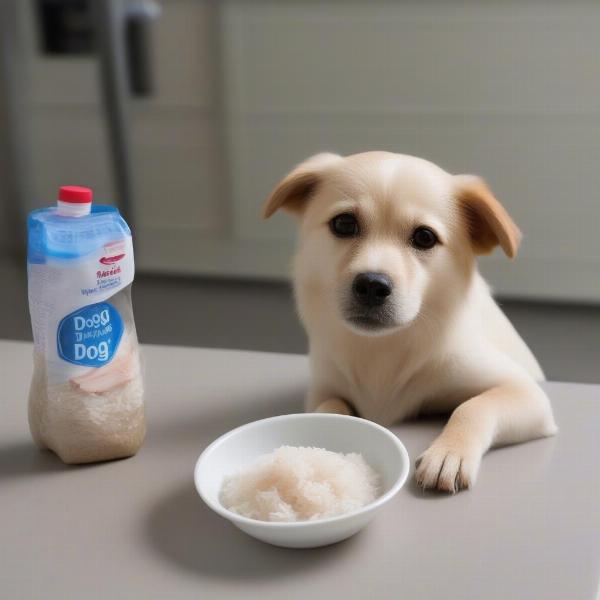Dog diarrhea after anesthesia is a relatively common occurrence. While often mild and transient, it can sometimes indicate a more serious issue. Understanding the potential causes, treatments, and when to seek veterinary attention is crucial for ensuring your furry friend’s swift recovery. This article provides a comprehensive guide to help you navigate this post-operative concern.
Why Does Anesthesia Cause Diarrhea in Dogs?
Several factors can contribute to dog diarrhea after anesthesia. The anesthetic agents themselves can sometimes irritate the gastrointestinal tract. Furthermore, fasting before surgery can disrupt the normal gut flora, leading to digestive upset. Stress and changes in routine associated with surgery can also play a role. Less commonly, diarrhea can be a side effect of medications administered during or after the procedure, such as antibiotics or pain relievers.
Managing Diarrhea at Home: Tips and Tricks
If your dog experiences mild diarrhea after anesthesia, there are a few things you can do at home to help manage the situation. Offer small, frequent meals of a bland diet, such as boiled chicken and rice. Ensure your dog has access to plenty of fresh water to prevent dehydration. You can also add a probiotic supplement to their food to help restore healthy gut bacteria.
Bland Diet Options for Your Dog
- Boiled chicken and white rice
- Plain, cooked sweet potato
- Cottage cheese (low-fat)
 Bland diet options for a dog with diarrhea
Bland diet options for a dog with diarrhea
When to Seek Veterinary Attention
While mild, transient diarrhea is usually not a cause for alarm, there are certain situations where you should seek veterinary attention. If the diarrhea persists for more than 24-48 hours, is accompanied by vomiting, lethargy, blood in the stool, or a loss of appetite, contact your veterinarian immediately. These symptoms could indicate a more serious underlying condition that requires prompt treatment.
Recognizing Concerning Symptoms
Is your dog experiencing any of these?
- Persistent diarrhea (more than 48 hours)
- Vomiting
- Lethargy
- Blood in the stool
- Loss of appetite
Preventing Diarrhea After Anesthesia
While not always preventable, there are some steps you can take to minimize the risk of your dog developing diarrhea after anesthesia. Discuss pre-operative fasting guidelines with your veterinarian. In some cases, a shorter fasting period may be appropriate. Probiotics can be administered in the days leading up to surgery to support gut health. Minimizing stress in the pre- and post-operative periods can also be beneficial.
Conclusion
Dog diarrhea after anesthesia is often a temporary side effect. However, it’s important to monitor your dog closely and seek veterinary attention if necessary. By understanding the causes, treatments, and warning signs, you can ensure your dog’s comfortable and safe recovery. dog diarrhea after anesthesia can be managed effectively with the right information.
FAQ
- How long does diarrhea last after anesthesia in dogs? Usually, it resolves within 24-48 hours.
- What should I feed my dog after anesthesia if they have diarrhea? A bland diet of boiled chicken and rice is recommended.
- Can I give my dog Imodium for diarrhea after anesthesia? No, never administer medication without consulting your veterinarian.
- Is blood in the stool after anesthesia normal? No, blood in the stool is a serious sign and requires immediate veterinary attention.
- When should I call the vet about post-anesthesia diarrhea? If the diarrhea persists for more than 48 hours, is accompanied by other symptoms, or if you are concerned.
- Can stress cause diarrhea in dogs after anesthesia? Yes, stress and changes in routine can contribute to digestive upset.
- How can I prevent my dog from getting diarrhea after anesthesia? Talk to your vet about pre-operative fasting and probiotics.
ILM Dog is your trusted resource for all aspects of dog care and well-being. We offer expert advice on dog breeds, health, training, nutrition, grooming, and more. From dog whining after sedation to magic mouthwash for dogs, we’ve got you covered. Contact us today for personalized support: [email protected] | +44 20-3965-8624. ILM Dog is here to help you every step of the way!